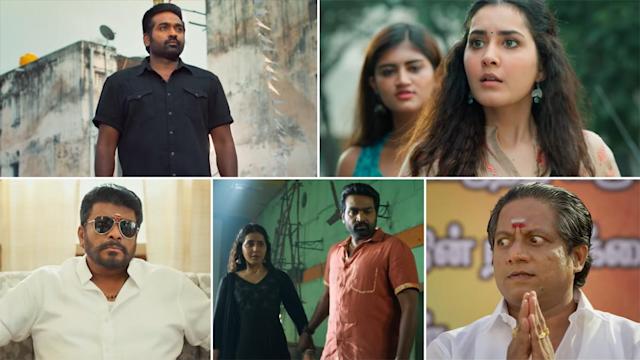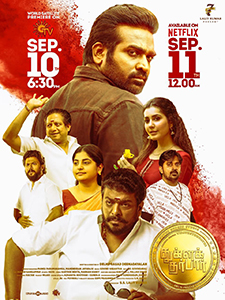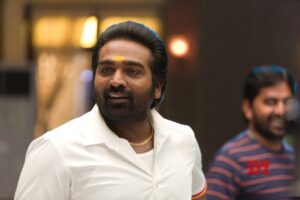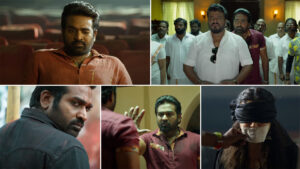Tughlaq Durbar Movie Review
Cast-;
Vijay Sethupathi ,Master Akshay Kumar ,Raashi Khanna ,Parthiban ,Manjima Mohan ,Gayathrie ,Sathyaraj , ,Bh ag vathi Perumal ,Karunakaran ,Rajkumar ,Samyuktha Karthik ,Prathap Pothen ,Madhan Bob ,Vettaim Muthuku mar ,Raju Sundaram special appearance in the song “Arasiyal Kedi” ,Kannan Ponnaiya Rayappan Gang ,Risha Jacop Dr. Raichal Rebecca as etc.
Crew-;
Story – Delhi Prasad Deenadayalan ,Directed – Delhi Prasad Deenadayalan ,Composer – Govind Vasantha ,Cou ntry of origin – India ,Original language – Tamil ,Production Producer – S. S. Lalit Kumar ,Cinematography – Man oj Param ahamsa ,Mahendiran Jayaraju ,Editor – R. Govindaraj ,Running time – 146 minutes ,Production compa ny – Seven Sc reen Studios ,Distributor – Netflix ,Release Original network – Sun TV Original release -10 Septem ber 2021 P R O – Yuvaraaj etc.
Story-;
Thuglaq Darbar is a political drama directed by Delhiprasad Deenadayalan with screenplay and dialogues wri tten by Balaji Tharaneetharan. It has Vijay Sethupathi, Radhakrishnan Parthiepan and Raashi Khanna in the lead roles, and Manjima Mohan, Karunakaran, Bagavathi Perumal among others in supporting roles. The film is pro duced by SS Lalit Kumar under the banner Seven Screen Studios.
Vijay Sethupathi plays the role of Singaravelan, fondly known as Singam. He suffers from a split personality dis order of sorts after being attacked in an alcohol party. How he manages to rise among the ranks in Rayappan’s (Parthiepan) political party and how he gains the trust of the people in his locality, despite the disorder forms the plot of the film.
WatchThe Trailor-;
Movie Review-;
Tughlaq Durbar is buoyed by a phenomenal idea — what if both the hero and the villain of a mass-masala story a re the same? The very title and title design of the film acknowledge themselves as an ode to the 14th-century De lhi Sultan, Muhammad Bin Tughluq, known for his grand visions undercut by disastrous hubris, a man who was b oth asset and liability — to himself and to his kingdom, much like Singaravelan (Vijay Sethupathi) here. A lady pol itician, when pregnant, goes to attend a political rally. In the middle of the meeting, she gives birth to a boy. As he grows up, he is quite attracted to politics and this is quite natural. He aspires to become an influential politician li ke Rayappan (Parthiban), in whose meeting he was born. Well, this boy is none other than Singaravelan alias Sin gam (Vijay Sethupathi). Singam tried to get closer to Rayappan with each passing day and slowly sidelines Man galam ( Bagavathi Perumal), a senior politician who has been with Rayappan for a long time. Does Singam succ eed in what he wants to do and manage to create a place for himself? To know that, you have to watch the film.
The gold coin on the title design perhaps references Tughlaq’s most famous faux pas — when he replaced gold and silver with copper and brass coins, but kept their value the same. This made it easier to forge the coins, and thus the money lost any value it had. Tughluq learned his lesson after the disastrous consequences and disc ont inued this policy. Directed by Delhiprasad Deenadayalan, the film skipped theatrical release and was released on Netflix directly. Soon, Singam, and the audience come to know that Singam is suffering from a split personality disorder. Especially when he is working along Singam, will he manage and be able to redeem himself in the eyes of his sister Manimekalai ( Manjima Mohan) and girlfriend Kamatchi (Raashi Khanna)? Also, at the same time, he is busy working with Rayappan for a multi-crore project to evict people from his locality? Singravelan undergoes a somewhat similar trajectory, where at the end he lands on his moral feet, having learned his lesson. This is a pr omise of the mass-masala genre itself — where the villain is vanquished.
And if the villain is within, why should it be any different? Tughlaq Darbar is very much entertaining. Vijay Seth upathi gives a great performance as someone who is suffering from such a disorder. His acting in every scene, wh ere he has to not let people know that he has a spilt personality, will leave you in splits. Parthiban, as usual, stole the show with his acting and screen presence. His performance will be remembered. Manjima Mohan and Raashi Khanna’s performances are quite effective. Wish they had a lot more to do.Alas, early on in this 2.5-hour film, th e filmmaking flaws are gin-clear — debutante director Delhiprasad Deenadayalan is unable to stage a scene with the required verve. This is a significant problem in Tughlaq Durbar, because nothing strikes even as the scenes ar e written with a dramatic flourish in mind. Take the opening sequence, set in 1986. (The frames are leached of co lour, a lazy visual trope to show datedness) We are in a politician’s rally, where a pregnant woman seated on the floor among the audience goes into labour.
The politician’s veshti, and those of his aides unfurl to provide a make-do private space to give birth. It’s such a st unning piece of writing, but when it plays out, it has this limp, lifeless quality. There is no visual drama, because there is no build-up, no tension, that is held to be released. I felt nothing. This visual vapidity completely dilutes the film — one filled with moments pregnant with dramatic potential, that just writing about it now makes my m outh water. The film toes the arc of Singaravelan, an ambivalent character whose only goal in life is to serve the politician Rayappan (Parthiban), for whom politics is not about faith but funds. Singravelan is orphaned (first his mother dies, and his father is seen breast-beating at her funeral, an interesting reversal of gender, and then his father is forsaken in grief-struck alcoholism) and has an ice-cold relationship with his younger sister whom he b lames for his mother’s death during her childbirth (another interesting reversal of the ‘anna-thangachi’ cloying-love trope).
He lacks a moral compass and slowly over the course of the film as he taps into his darker, more machiavellian im pulses, he develops another personality within him, the do-gooder reformist. Take the scene where this dual pe rsonality kicks in for the first time — he is walking down the narrow space between two buildings, it is nighttime with only the sodium streetlights for company. He has just been hit on the head with a glass bottle so he is stag gering along like a drunkard, and slowly instead of one shadow we see two shadows emerging. It is one of those circumstances which is possible in life, but in cinema, is elevated to metaphoric heights. How lovely this moment is on paper! However, when it played out, the scene lacked a punch, the music not emphatic enough, the framing not spectacular enough, the drama not palpable enough. The fact that this was anomalous, a strange occurrence is not established with the firmness it deserved.Similarly, there is another fantastic scene where the evil Sin gar avelan screams at a mirror, at his reflection, but also at this alternative personality who is ruining his chances of political success with his steadfast unconditional moral compass.
But the scene just played out like a screech, Sethupathi’s vocal fry talent wasted on a mere possibility. (Much like his character in Edhiri in Netflix’s anthology Navarasa, another film, flush with interesting ideas, flushed by its la zy writing) Take the scene where election results are announced — Singravelan is running for the corporator po sition against an incumbent bastion. There is not a strain of tension running through it, and soon the film looks and feels dead, where even the music sequences — punctuations meant to inject energy into a plot — just about come and go. So maybe, to look at the merits of the film, I should look at the writing, because there are some sig nificant achievements here — like the brother-sister story that begins on a bad note, without affection or respo nsibility, though the sister’s character (Manjima Mohan) is squandered in low-stakes scenes.
There is also the infusion of love which has a refreshing, ironic twist — Singaravelan kidnaps Kamatchi (Rashi Kh anna), but his other personality kicks in and he saves her, depositing her safely to her family — but, as with most things, this strand has no charm beyond the set-up.Satyaraj’s cameo, Govind Vasthantha’s music, cine ma tog ra phy by Manoj Paramahamsa, and Mahendran Jayaraju are assets for the film. Direction and screenplay are also done quite well and it is high time that audience watches it this weekend. Finally, the film ends on an amusing no te.If the title is filled with references to a Muslim king — and while the movie has no explicit religiosity binding it there is also deliberate framing, such as the scene when right after Singravelan confronts Rayappan, and turns virtuous, he is seen walking along a mosque, foregrounding men dressed in white and skull caps — the names ha ve a strong pull of Hindu mythology. Kamatchi, the goddess, is the name of Singravelan’s lover; Manimegalai, Ka lidasa’s famous poem, is the name of Singravelan’s sister; Damayanti, from the Mahabharata, is the name of a sinister NGO head whom Singravelan is working with.
Subtle as they are, these references are just as watery as the women themselves, who don’t even have enough flesh on their characters to justify their names.Besides, what does one do with such subtle embellishments? Ev en the action sequences in Tughlaq Durbar lack the spirited, seamless mix of audio and video. When a hockey stick is whacked across a face, it should both look and sound like violence on impact. Here, the audio is on ove rd rive as the staging is dull, resistant, almost shy of the action it is expected to perform. When nives are slit across skin, I can hear the metal, I can see the blood, I can’t see the metal causing the blood. A lull-like stunt choreogr ap hy takes over the scene, which is clawing towards the end of a mammoth run-time, one whose weight is felt all the more given its execution.The film is girded by the politics of community building. When Singravelan is or ph aned, it is the community that steps in and takes care of him and his sister.
When Singravelan is shown carrying a pregnant woman in labour to the hospital, they recognise that he is a good man, and vote him into power. It is thus irrelevant that Singravelan actually carried her for sympathy-gaining the atrics when he could have taken an auto — that he did this so people could see him being virtuous and vote him in, and by carrying a pregnant woman had risked her health. Towards the end, when Singravelan is beaten up by the goons of his former boss, it is the same community he betrayed that nurses him back to health. Whether the violence was deserved or not is irrelevant. Because in the politics of community building, intention rarely mat te rs. It is the impact that buoys community mobilising — it is not what you feel but what you intend to do about tho se feelings. If, like the doctor said, the pregnant woman had miscarried instead of giving birth to a beautiful boy, I surmise, no one would have voted for him. That is how it works. Singravelan gambled on the impact of his shrewd intent. He won once. And in the end, he wins again. I wish the same could be said of the film.
This IS MY Personal Review So Please Go And Watch The Movie In Nerfix O T T Platform Special Screening To Day 6.00 pm On Sun TV
Written By- T.H.PRASAD -B4U-Ratting-4 /5








































